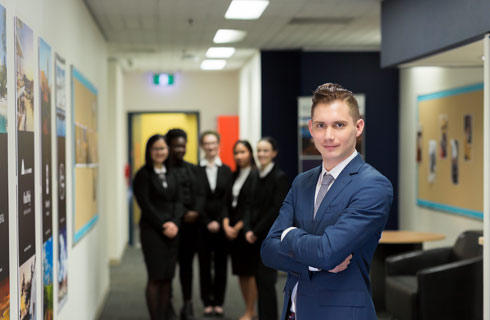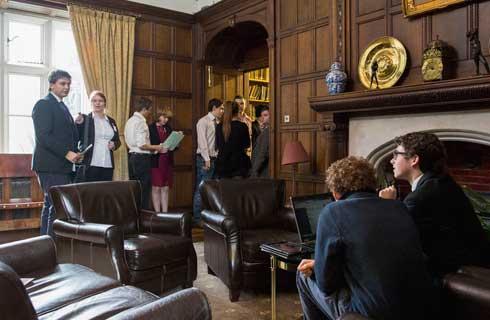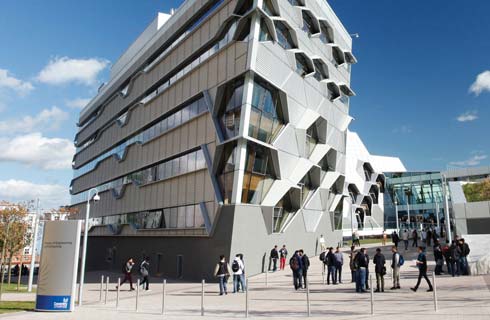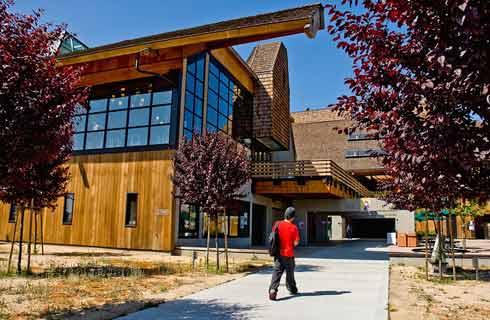Master of Fine Arts in Interdisciplinary Media Arts

学历文凭
Masters Degree

专业院系

开学时间

课程时长

课程学费

国际学生入学条件
Online Application (most documents below can be uploaded through the application site)
3 Letters of Reference
Curriculum Vitae/Resume
Three Statements: Personal, Biographical, Research and Creative interests. Applicants must answer the following questions in the Research/Creative Arts Statement: Are you a media arts practitioner and if so, what forms of media have you been working in? What aspects of the media arts would you explore if you were admitted to the Interdisciplinary MFA Program in MCMA? What compels you to create artistic works that utilize forms of media? Please elaborate on any personal connections you may have regarding themes or ideas that you feel are central (or emergent) to your work(s). Please describe any artists (regardless genre or medium) whose work you admire or has influenced you. How is your work situated into contemporary media arts practice? Please include any relevant theoretical, historical or aesthetic practices you feel might apply.
Portfolio of works in at least one media. DVD or URL preferred. A .doc or pdf file with URL for web portfolios can be uploaded. Otherwise discs can be sent via post.
Transcripts (3.0 minimum gpa-originals must be sent via post)
International applicants should have excellent English speaking and writing skills. Those who have not taken significant advanced study in programs taught in English will have to take the TOEFL or IELTS. Minimum scores: TOEFL: IBT - 100, Computer - 250, Paper - 600. IELTS: 7.0
3 Letters of Reference
Curriculum Vitae/Resume
Three Statements: Personal, Biographical, Research and Creative interests. Applicants must answer the following questions in the Research/Creative Arts Statement: Are you a media arts practitioner and if so, what forms of media have you been working in? What aspects of the media arts would you explore if you were admitted to the Interdisciplinary MFA Program in MCMA? What compels you to create artistic works that utilize forms of media? Please elaborate on any personal connections you may have regarding themes or ideas that you feel are central (or emergent) to your work(s). Please describe any artists (regardless genre or medium) whose work you admire or has influenced you. How is your work situated into contemporary media arts practice? Please include any relevant theoretical, historical or aesthetic practices you feel might apply.
Portfolio of works in at least one media. DVD or URL preferred. A .doc or pdf file with URL for web portfolios can be uploaded. Otherwise discs can be sent via post.
Transcripts (3.0 minimum gpa-originals must be sent via post)
International applicants should have excellent English speaking and writing skills. Those who have not taken significant advanced study in programs taught in English will have to take the TOEFL or IELTS. Minimum scores: TOEFL: IBT - 100, Computer - 250, Paper - 600. IELTS: 7.0
IDP—雅思考试联合主办方

雅思考试总分
7.0
- 雅思总分:7
- 托福网考总分:100
- 托福笔试总分:600
- 其他语言考试:NA
CRICOS代码:
申请截止日期: 请与IDP联系 以获取详细信息。
课程简介
Our 3-year MFA in Interdisciplinary Media Arts uniquely integrates contemporary artistic practice with studies in media production, history and theory. Students in this terminal degree program spend a first year exploring interdisciplinary approaches to making media as an artistic practice while becoming familiar with the contemporary media art landscape. First year is for experimentation and risk-taking in storytelling and aesthetic expression, as part of building a critical understanding of art and media in a social context. Classes with faculty in film criticism and history, media theory, social justice, race, and the political economy of media offer a solid academic grounding.
相关申请
 预科
预科 奖学金
奖学金 实习机会
实习机会 在校学习
在校学习 跨境学习
跨境学习 校园授课-线上开始
校园授课-线上开始 在线/远程学习
在线/远程学习
开学时间&学费
学费信息仅供参考,请与IDP联系以获取详细信息
| 开学时间 | 时长 | 学费 | 地点 |
|---|---|---|---|
| 暂无 | 暂无 | 暂无 | 暂无 |
本校相关课程

动物学学士学位
学历文凭
Bachelor Degree
开学日期
课程费用总额


Bachelor of Science in Zoology
学历文凭
Bachelor Degree
开学日期
课程费用总额


Bachelor of Arts in Theater
学历文凭
Bachelor Degree
开学日期
课程费用总额


Bachelor of Science in Sport Administration
学历文凭
Bachelor Degree
开学日期
课程费用总额


Bachelor of Arts in Sociology
学历文凭
Bachelor Degree
开学日期
课程费用总额


Bachelor of Science in Social Work
学历文凭
Bachelor Degree
开学日期
课程费用总额

其他相关课程

传播学文学士
 劳伦森大学
劳伦森大学学历文凭
Bachelor Degree
开学日期
课程费用总额


修辞与传播学学士学位
 温尼伯大学
温尼伯大学学历文凭
Bachelor Degree
开学日期
课程费用总额


专业传播学文学士
 皇家大学
皇家大学学历文凭
Bachelor Degree
开学日期
课程费用总额


传播学文学士
 劳瑞尔大学
劳瑞尔大学泰晤士高等教育世界大学排名:1491
学历文凭
Bachelor Degree
开学日期
课程费用总额


英语文学士-修辞学[一般]
 滑铁卢大学
滑铁卢大学学历文凭
Bachelor Degree
开学日期
课程费用总额


英语文学士-修辞学
 滑铁卢大学
滑铁卢大学学历文凭
Bachelor Degree
开学日期
课程费用总额










 美国
美国
